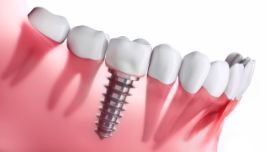
Tooth loss can have a huge impact on your overall quality of life. Bridges and dentures were the only solutions for many years, and while these options can be quite effective, they do have several drawbacks. Fortunately, modern dentistry offers a third solution that’s superior in many ways: dental implants. If you’ve been considering this procedure, one of the first questions you may have is, “What is the cost of dental implants?” Although it’s impossible to provide a figure that applies to everyone, this blog will give you a general idea and explain some of the factors that determine the final cost. You’ll also learn about the many benefits of implants and find out if they’re a good investment or not. Learn more below!
What Are the Benefits of Implants and Are They Worth the Investment?
The fact that implants replace the roots of missing teeth distinguishes them from other options and accounts for many of their advantages, including:
- Your jawbone is maintained – Implants simulate the surrounding jawbone and maintain it over time, just like natural teeth do.
- Superior chewing strength and stability – The roots of your teeth are what gives them strength. Implants are prosthetic roots (that are then completed with either a dental crown, bridge, or denture), so they feel and function more like your own teeth than any other option.
- Self-confidence – Implants won’t slip during a meal or conversation like a denture can, so you won’t have to worry about anyone knowing you’ve lost teeth.
- Longevity – Traditional dentures and bridges are less expensive initially, but they only last an average of 5-10 years. In addition, continual re-lines and adjustments are necessary to keep a denture fitting well. Dental implants are a fantastic long-term investment because they can last many decades with proper care and maintenance.
What Is the Cost of Implants?
Every patient is unique, so the final cost will depend on your individual situation. However, the average cost in most areas for a single implant is between $3,000-$4,500.
Here are some of the factors that affect the final cost:
- Whether you have adequate bone mass in your jaw – If you’ve lost some of the bone mass in your jaw (which naturally occurs over time after tooth loss), you may need a bone graft to provide the support an implant needs.
- Whether you need extractions or gum therapy – If you have active gum disease or any teeth need to be extracted, those treatment costs will be factored in.
- The number of implants you need – A single implant will include the cost of the dental crown that’s needed to complete it. For multiple missing teeth, an implant-retained bridge might be recommended instead.
- Whether an implant-retained denture is necessary – If you’re missing all of your teeth, you might benefit from an implant-retained denture. This involves placing just 2-4 implants per arch, which are significantly smaller than regular implants, before attaching a denture.
With so many possibilities, the first step is to schedule a consultation with a dentist. After evaluating your needs, they’ll be able to create a treatment plan and give you a more specific figure!
About the Author
Dr. Tyler Wheeler is a general and implant dentist who earned a Master’s degree in Biomedical Sciences before completing the dental program at the University of Mississippi Medical Center. He understands that finances are often a concern for his patients and always keeps that in mind when creating a treatment plan. If you have any other questions about the cost of dental implants, he can be reached through his website.

